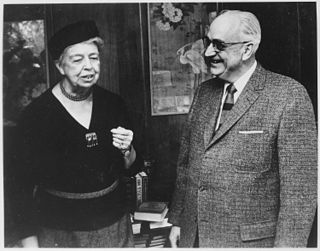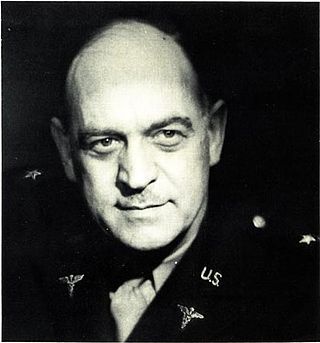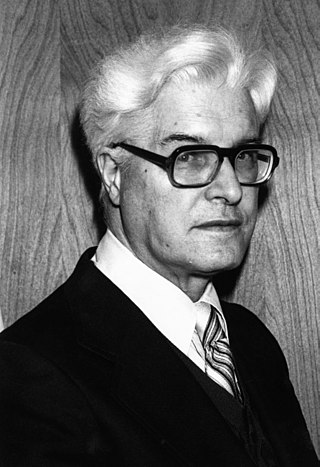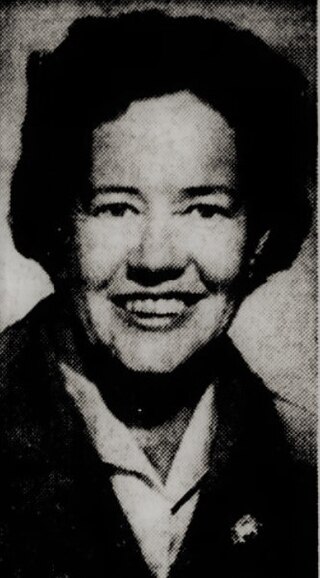
Karl Augustus Menninger was an American psychiatrist and a member of the Menninger family of psychiatrists who founded the Menninger Foundation and the Menninger Clinic in Topeka, Kansas.

William Claire Menninger was a co-founder with his brother Karl and his father of The Menninger Foundation in Topeka, Kansas, an internationally known center for treatment of behavioral disorders.
The Menninger Foundation was founded in 1919 by the Menninger family in Topeka, Kansas. The Menninger Foundation, known locally as Menninger's, consists of a clinic, a sanatorium, and a school of psychiatry, all of which bear the Menninger name. Menninger's consisted of a campus at 5800 S.W. 6th Avenue in Topeka, Kansas which included a pool as well as the other aforementioned buildings. In 2003, the Menninger Clinic moved to Houston. The foundation was started in 1919 by Dr. Charles F. Menninger and his sons, Drs. Karl and William Menninger. It represented the first group psychiatry practice. "We had a vision," Dr. C. F. Menninger said, "of a better kind of medicine and a better kind of world."

Karl Kalman Targownik was a psychiatrist and Holocaust survivor.
Murray Bowen was an American psychiatrist and a professor in psychiatry at Georgetown University. Bowen was among the pioneers of family therapy and a noted founder of systemic therapy. Beginning in the 1950s he developed a systems theory of the family.
William Walter Menninger, known by his peers as "Dr. Walt", is an American psychiatrist in the third generation of the Menninger family, which has run the Menninger Foundation since 1925. He served as dean of the Karl Menninger School of Psychiatry and Mental Health Science and he was the CEO of the Menninger Clinic from the 1993 to 2001. During his tenure as CEO, the clinic began negotiations to move from Topeka, Kansas, to Houston, Texas, where it is affiliated with Baylor College of Medicine.

Henri Frédéric Ellenberger was a Canadian psychiatrist, medical historian, and criminologist, sometimes considered the founding historiographer of psychiatry. Ellenberger is chiefly remembered for The Discovery of the Unconscious, an encyclopedic study of the history of dynamic psychiatry published in 1970.

The Austen Riggs Center is a psychiatric treatment facility in Stockbridge, Massachusetts. It was founded by Austen Fox Riggs in 1913 as the Stockbridge Institute for the Study and Treatment of Psychoneuroses before being renamed in honor of Austen Riggs on July 21, 1919.
Robert S. Wallerstein was a prominent German-born American psychoanalyst. He headed the Psychotherapy Research Project of the Menninger Foundation and was president of the International Psychoanalytical Association.
Nathan W. Ackerman was an American psychiatrist, psychoanalyst, and one of the most important pioneers of the field of family therapy. He also was an expert in marriage counselling.
Glen Owens Gabbard is an American psychiatrist known for authoring professional teaching texts for the field. He is Clinical Professor of Psychiatry at Baylor College of Medicine in Houston, Texas, and is also training and supervising analyst at the Center for Psychoanalytic Studies in Houston.
Slavko Ziherl, MD, PhD was a Slovenian specialist in psychiatry.
Menninger is a surname. Notable people with the surname or its variant Meningerg include:
Charles Frederick Menninger was a physician who co-founded the Menninger Foundation with his sons, Karl and William.
Thomas Forrest Main (1911–1990) was a psychiatrist and psychoanalyst who coined the term 'therapeutic community'. He is particularly remembered for his often cited paper, The Ailment (1957).

Elmer Ernest Southard was an American neuropsychiatrist, neuropathologist, professor and author. Born in Boston, Massachusetts, Southard lived in the city for nearly his entire life. He attended Boston Latin School and completed his education at Harvard University. At Harvard, Southard distinguished himself as a chess player. After briefly studying in Germany, he returned to the United States as a pathologist at Danvers State Hospital. Southard held academic appointments at Harvard University and its medical school.
John Clare Whitehorn, M.D. (1894–1974) was an American psychiatric educator during the mid-20th century.
John M. Oldham is an American psychiatrist who is a distinguished emeritus professor at the Baylor College of Medicine.

Irene Jakab was a psychiatrist and humanist who was a member of the Harvard University School of Medicine faculty prior to designing and directing "the John Merck program for mentally retarded emotionally disturbed children at Western Psychiatric Institute and Clinic (WPIC)" at the University of Pittsburgh in Pittsburgh, Pennsylvania from 1974 to 1982.







